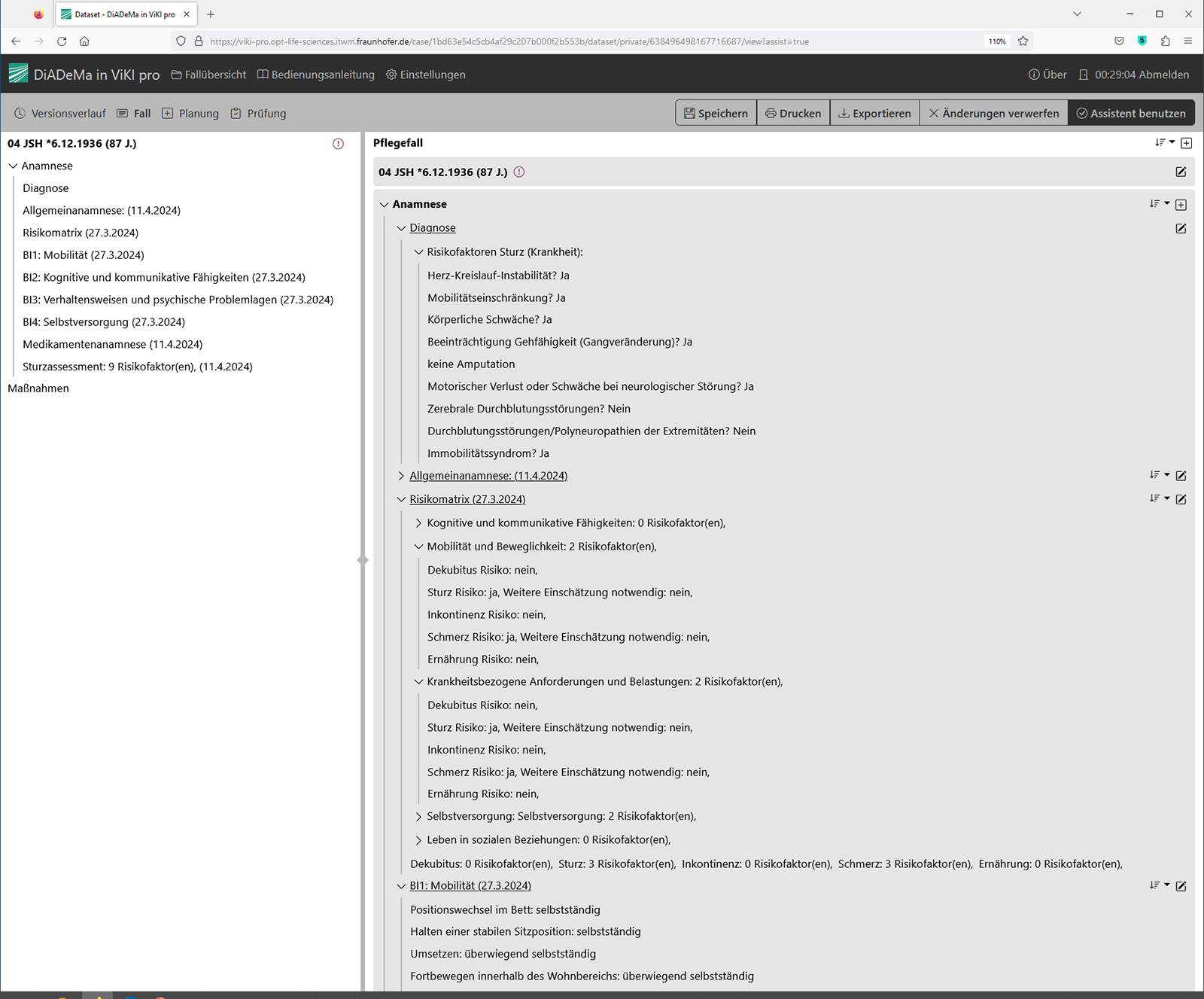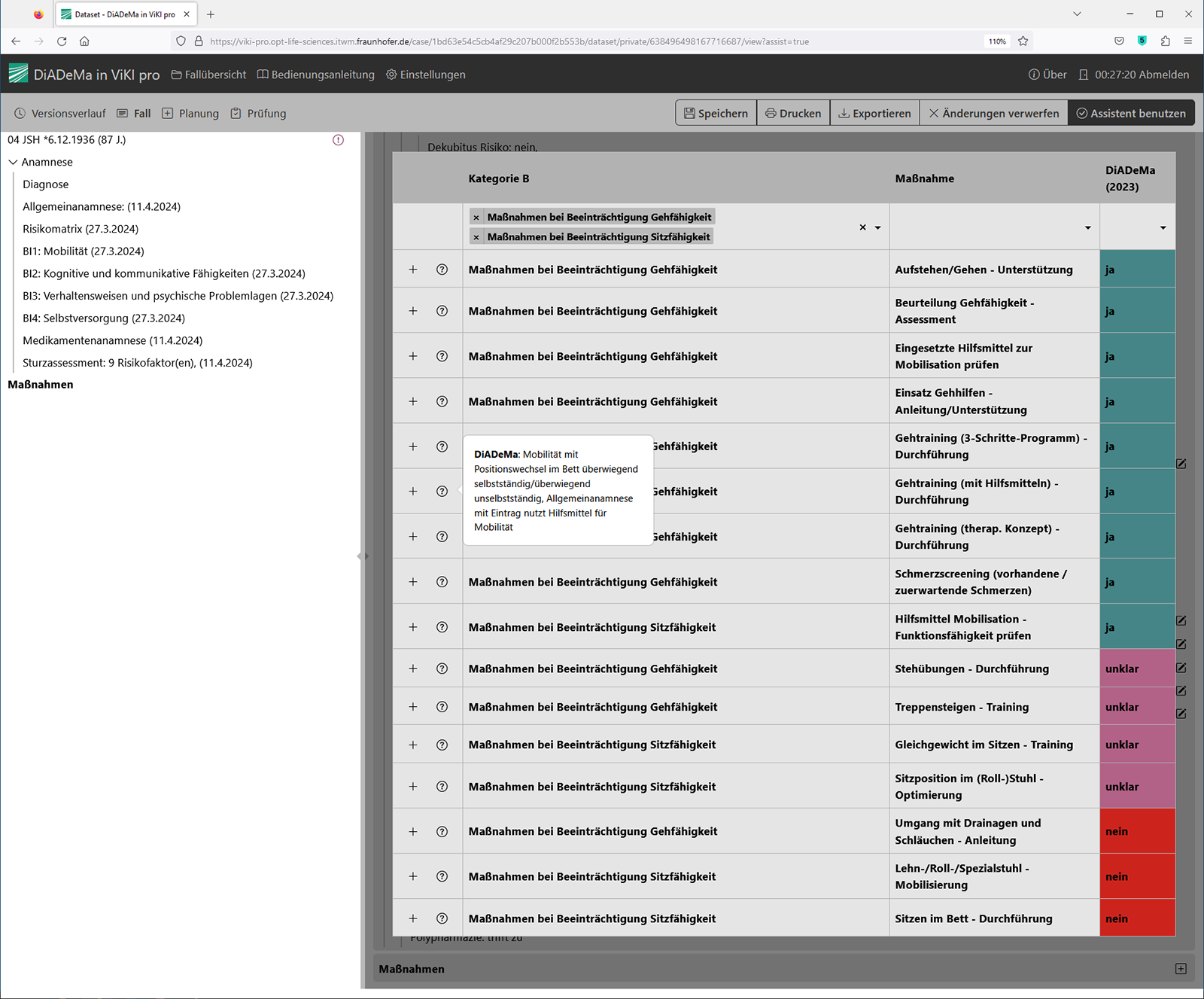The situation in the care sector is under strain with fewer and fewer carers available to look after more and more patients. The number of patients is steadily increasing and, according to projections by Statista, will grow to over 4.6 million by 2060. Highly trained carers with wide-ranging specialist knowledge are required to provide care. Since patients’ needs are individual and varied, complex care situations call for critical decisions to be made in a short period of time. AI-based, digital systems present the chance to relieve the burden on care staff, reduce the stress of their day-to-day work, both improve and increase the efficiency of workplace organization and routine tasks and therefore create more time for care duties.
Web application for digitally assisted care planning
As part of the ViKI pro project, Fraunhofer ITWM, together with specialist partners from the care sector, applied care, research and industry, is developing and trialing exactly this kind of knowledge and data-driven assistance system to help shape professional care processes in long-term care. The system allows care specialists to identify individual care needs and plan appropriate measures using digitalized specialist knowledge. The documentation of the care measures implemented in the web application also helps to accumulate practical knowledge that can be used for similar planning situations in the future. By digitalizing processes, the goal is to improve the quality of inpatient care while conserving the limited resources available. The German Federal Ministry of Education and Research (BMBF) is backing the project as part of the “Together through Innovation — Interactive Technologies for Health and Quality of Life” program. In addition to Fraunhofer ITWM, the consortium includes the August-Wilhelm Scheer Institute for digital products and processes gGmbH, Connext Communication GmbH, Johanniter Seniorenhäuser GmbH, Caritas Betriebsführungs- und Trägergesellschaft GmbH as well as the AOK Federal Association as an associated partner. The German Institute of Applied Nursing Research (DIP) coordinates the project.
Using precise case data, in-depth expertise and suitable AI methods
A project team consisting of research scientists Dr. Maximilian Pilz, Dr. Jonas Flechsig and Murray Heymann, led by Dr. Alexander Scherrer, is working on the ViKI pro project at Fraunhofer ITWM in Kaiserslautern. “Our aim is to enable staff in applied care to efficiently plan optimal care services based on existing expertise and experience, tailored to each case,” says Dr. Alexander Scherrer, deputy head of the “Optimization in Life Sciences” department. “We employ a model-based approach, which uses the existing expertise and digitalizes the data so it can be processed by AI.”
The quality of the data sets used is key here. Each care case is therefore entered in ViKI pro with a comprehensive and detailed medical history including a risk matrix, considering numerous factors such as whether the patient is bedridden, able to take care of themselves, overweight, depressed, tired during daily activities, has a cognitive impairment, etc. The system developed by Fraunhofer ITWM then employes artificial intelligence that uses the case data combined with digitized care know-how to suggest suitable care measures. In a first step, the researchers are focusing on the topics of ‘mobility’ and ‘pain’.
AI supports, humans decide
“When care planners upload a case to the software, the system automatically analyzes the knowledge base and suggests case-specific care measures including reasons why certain measures are the optimal choice. This way, the software replaces the manual, potentially error-prone process of finding and weighing up individual measures,” the researcher explains the advantage of the AI-based application. Care planners can then apply their experience to assess the proposals and choose suitable measures.
In doing so, ViKI pro maps the established manual care planning process, which is carried out with classic care documentation systems, and develops it further into an AI-supported process. Thanks to the integration of the care documentation, ViKI pro offers comprehensive digital process support.
“Once the measures have been implemented, care staff can assess their effectiveness. With the help of AI, we can derive actionable insights from these data sets to inform future care decisions,” says the mathematician.
An initial prototype of the system will already be tested in Caritas and Johanniter care facilities this summer.

